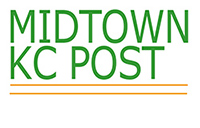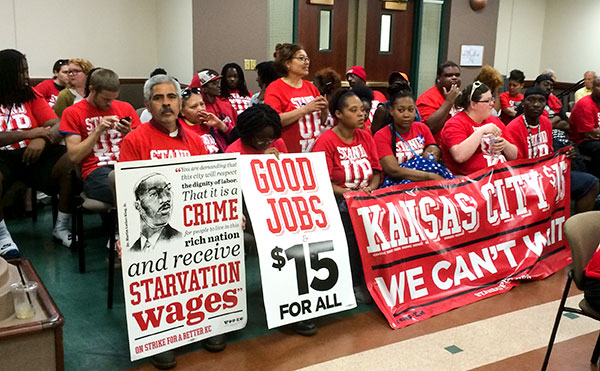After six weeks, the final meeting of citizens for and against a higher city minimum wage agreed on little except a starting point.
An increase to about $9 an hour would be appropriate to start, they said, but opponents want that increase spread over two years and supporters want it all on Aug. 24.
Opponents then want any more hikes tied to area cost of living increases and advocates say that just locks people into permanent poverty.
An ordinance introduced by Councilman Jermaine Reed and supported by those who gathered enough signatures to force a public vote calls for an increase to $15 an hour by 2020. The current state minimum wage is $7.65.
Facilitator Scott Helm of the UMKC Bloch School of Management will now report each side’s positions on Thursday to the city council.
A final council vote is scheduled for July 16, but little is clear beyond that. Business interests, including a letter made public Monday from the Greater Kansas City Chamber of Commerce, say they will sue the city if it raises the wage.
The city at first said it did not have the authority under state law to raise its minimum wage, but changed that after the state legislature passed a bill – not yet signed into law by the governor. The bill clearly forbids such city action but allows it if laws are passed before Aug, 28, when the new law would go into effect.
The governor could veto it and it could never go into effect but lawyers say just the legislature vote for it could help the city contend in court that it can raise the minimum wage.
Also, those who gathered the petitions for the hike to $15 an hour by 2020 could move to put the matter to a November vote, which if it passes might or might not be upheld by judges.
Mayor Sly James, at the Monday meeting, voiced frustration at the philosophical and profound disagreements between advocates for business and for the poor.
“It’s like two ships going different directions – they’re never meeting, there is no coming together on anything,” James said.
He agreed it was time to raise the minimum wage but said the issue was forced on the city too quickly.
“This is too complicated, too many things to consider to do it the way we are,” he said.
He has circulated a substitute ordinance that would gradually raise the minimum wage to $13 an hour by 2020 for most businesses and 2021 for small businesses.
But city officials have spoken of lower wage hikes. Opponents in the Monday meetings contend the city, with its lower cost of living, should not even consider raising it to $15 an hour like Seattle, San Francisco, Los Angeles and other coastal cities.
Economist Arindrajit Dube of the University of Massachusetts suggests that the minimum wage should be at 50 percent of an area’s median wage. For 2014 in Kansas City, that minimum wage would be $8.74 an hour, Helm reports.
A year later, it would be about $9 an hour, which is where the substitute ordinance would raise it on Aug. 24.
But business leaders say that would bankrupt some businesses that have set budgets for this year and it should be phased in over two years.
Any further hikes should be tied to the area cost of living index, said Jason Pryor of the Greater Kansas City Restaurant Association.
Gina Chiala, of Standup KC, said that would just “keep workers in the same place,” and “doesn’t close the gap between the rich and the poor.”
Pryor said the minimum wage cannot do that – there will always be low paid workers and paying them too much will just fuel inflation.
Advocates for the hike cite federal MIT poverty numbers that suggest a living wage for one adult and child here would be $20.78 an hour.
Opponents object to even use of the term living wage.
Mayor James said of the council, “both sides have put us in the crosshairs.”
When it is over, he said, both sides will be unhappy.
And lawyers and judges will go to work.




Trackbacks